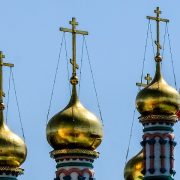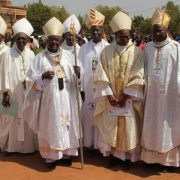
On the eve of Deng’s centenary, China and the rest of the world may want a different understanding to solve their growing attrition and avoid war. The Vatican should play a role.
The present tensions surrounding China have many origins, but a crucial one revolves around the 2008 financial crisis — then, U.S. and Asian concerns began to coalesce and became deeply intertwined.
At that time, China stepped in to buy failing American bonds and thus reined in a freewheeling crisis. Yet, at the same time, it refused to appreciate its currency, the RMB, and hence undercut exports from neighboring Asian countries.
More trade and political tensions widened the new rift in the following years. The U.S. gradually boosted and was encouraged to boost regional and global military and security alliances around China by several Chinese neighbors worried about Beijing’s growing assertiveness.
Presently, new technological and intellectual property rights (IPR) concerns are helping shift production from China to other countries, creating unprecedented incentives for global economic drivers. Places like India and Vietnam are interested in maintaining pressures around China. They might not want an all-out destructive and unpredictable war. Still, they might wish for simmering tensions to continue as it quickens the pace of an industrial passage, driving investment out of China and into their own countries.
This complicated tangle is impossible to unravel with a simple bilateral agreement by any single country. Even if the U.S., under a new president, were determined to cut a deal with China, it could not ignore the stakes of Japan, India, and Vietnam and leave them behind after over a decade of improving ties. In fact, any Chinese bilateral progress could complicate multilateral links, as other countries would grow more concerned and worried about activities with China. This has its own dynamic.
Any serious attempt to sort out the issue must adopt a multilateral approach where all stakeholders engage with China. This would be difficult with existing dynamics; it could create more attrition, but it is the only strategy that might work.
It would be a highly complex approach, especially since the UN has long ceased functioning as an effective international platform for mediation.
The only other reasonable place is the Holy See, the capital of the largest unitary religion in the world, which has an accepted role in working for global peace.
Non-Ideological Approach
Dealing with China is possibly the world’s most significant challenge of the last few centuries. The Cold War occurred entirely within the Western system and thinking. Its roots lie in the 1789 French Revolution and the struggle between those who emphasized freedom and liberty, which helped grow a capitalist market over concerns about income inequality, and those who emphasized equality, thus communism, over market freedom and perceived injustices. Additionally, there was a geopolitical clash between the new incarnation of the Russian land empire and the U.S., heir to the British sea empire.
China shares elements of this historical narrative, but not only those. Communism in China was grafted onto a preexisting imperial system. The old imperial system was decayed and collapsed. However, the revolutionaries who rose against the empire a century ago, both the nationalists of the KMT (before moving to Taiwan after 1949) and the communists of the CPC, never took the time to truly absorb the Western capitalist system as Japan or South Korea did. Their mindset remained grounded in the old Chinese imperial system that was to be updated and improved but remains radically different from the Western approach.
This imperial system is not simply an “authoritarian” dictatorship, as some superficial critics may wish to label it. It is a far more complicated and sophisticated organism. It developed the first bureaucracy, which was later imitated and adapted in the West, and helped to propel the birth of the modern capitalist state.
In a dictatorship, the tyrant can move things left and right according to his whims. Within the imperial bureaucratic structure, the emperor can choose the officials and adjust the rules and regulations of the bureaucracy, but he governs through it. Shortcuts through the bureaucracy are complex and can be disruptive to the ruling edifice. The emperor is the ultimate motor of what is otherwise a self-propelling engine.
Deng, whose centenary will be celebrated on August 22, when he took power in 1978, found a demoralized party lacking faith in the system. He rebuilt it, turning officials into private entrepreneurs. They could utilize public resources privately and thus create wealth for themselves and the country.
However, this ultimately led to vast and unchecked corruption that is being addressed forty years later by distancing private entrepreneurship from officials and making officials responsible only to a top-down chain of command. President Xi Jinping is re-establishing an updated version of the imperial system that is far more comprehensive and sophisticated than the old empires could ever be.
There could be many reasons for this, but one in particular: the Chinese recognize an imperial bureaucracy when they see it; it is in their cultural DNA. They are not entirely clear about capitalism and the free market or the fine distinctions between legitimate and illegitimate business practices. Moreover, China is obsessed with itself and its history, making it hard to imagine a world different from its own. Therefore, Xi is aware of what he is doing and might feel less confident if he were to move China toward capitalism.
A historical Jump
It is reasonable; perhaps it fails to see things from another perspective. In the past century or so, the world population has multiplied about tenfold. Average life expectancy has tripled, and the quality of life has improved more and faster than at any other time in history. Electricity has canceled the difference between night and day; air conditioning gives constant summer and winter temperatures. Global communications can be instantaneous. Limits that marked human lives for a million years do not exist anymore.
We are witnessing an unprecedented boom in scientific and technological advances. To find a similar explosion in history, we must look back to around the 5th century BC when cities started flourishing worldwide, and philosophers openly debated the best ways to rule and face new challenges.
It was during the Axial Age when thinkers thrived simultaneously in the Mediterranean, India, and China. A demographic explosion accompanied the spread of cities and unprecedented improvements in quality of life. While drawing comparisons is tricky and potentially misleading, we see a similar explosion now. Back then, it was driven by cities and debates among pundits; today, it is driven by liberal capitalism and its new “modern” states.
If China doesn’t embrace this shift, it might maintain its cultural and political stability but miss out on historical progress. Or it might lose both if anything goes wrong. Nonetheless, the Chinese neoclassical bureaucratic state (here) may not necessarily conflict with liberal capitalism. Just as Japan adapted its imperial traditions to modern demands during the Meiji Restoration in the 19th century, so too could China adapt its traditions.
Liberal democracy is not a requirement; it is an accident of history. More or less, “authoritarian” states have been the historical political hallmark of most of the world. Therefore, it is naïve and misleading to pit democracy against dictatorship as if in a Manichean struggle between good and evil, viewing “anti-democratic coups” or “free elections” as gateways between the two.
A recent book (Marcel Dirsus, How Tyrants Fall, 2024) is a fulminating example. Erudite and entertaining, it casually cites cases from past authoritarian regimes—Catherine of Russia or various African dictatorships—all ostensible specimens of tyranny. Yet, the book glaringly exhibits a superficial Western approach, dismissive of all it deems “undemocratic.” The experience of the Chinese Communist Party School establishing new organizations in some African countries is something the West should deeply consider. As an academy to prepare and groom top leadership, the Party School harkens back to the Imperial Academy, Taixue (太学), whose buildings are still preserved in central Beijing at Guozijian. The institution for higher learning of officials inspired similar Western organizations like the ENA (École nationale d’administration) in France.
Lumping together on the same pages in the same book Catherine the Great and Idi Amin blurs and confuses everything.
Russian President Vladimir Putin is not just a “dictator”. He has a neo-czarist project. The czar had an aristocracy of warriors and generals blessed by the Orthodox Church, monopolizing all resources. Putin has an aristocracy that monopolizes all of the resources of intelligence and army generals. The czars’ economy was based on selling timber, grain, and furs. Putin’s economy is based on timber, grain, and energy sales. The common people are in the countryside. Millions of their lives are being destroyed in a meaningless war because their lives were worth nothing, to begin with, for their ruler. It’s not different from when the serfs were negligible and dispensable cannon fodder in many European wars.
China can be right, brushing up on some of its past, but it needs to do better than Russia. Its economy, however troubled and misaligned, is better than Russia’s. It has changed: it’s along the seacoast, not along the river shores; it’s made of factory workers, office clerks, no longer farmers as it had been for millennia. They are single children, precious more than gold or treasured stones to families of lonely parents and grandparents. It’s all very different from when the Son of Heaven ruled the yellow earth.
Not all democracies are the same, nor are all “nondemocratic” countries. However, Dirsus’ book illustrates how one can learn profoundly from open debate and that disagreements can sometimes be more instructive than agreements. It serves, after all, as a lesson from the Chinese past. Zhuangzi (4th – 3rd century BC), a pillar of Chinese philosophy, often debated and disagreed with Hui Shi. Yet when his “adversary” passed away, Zhuangzi went into deep mourning because he would no longer have someone with whom to discuss and learn.
At the same time, China must face squarely the extreme gravity of the issues and the legitimate reasons of others.
If we want to avoid war and find a solution with China, Western countries and China need a more practical approach while clearly understanding that liberal democracy is vital for a country’s development. Yet, democracies are hard to manage and can quickly slip into some form of old-fashioned or new authoritarianism. It could be the end of the West, but it could also be a dramatic stop to the incredible burst of growth and development of the past two centuries with unfathomable consequences. Nobody would win then, and everybody would lose, first the bitterest enemies of the West and its capitalism.
- In partnership with Appia Institute





